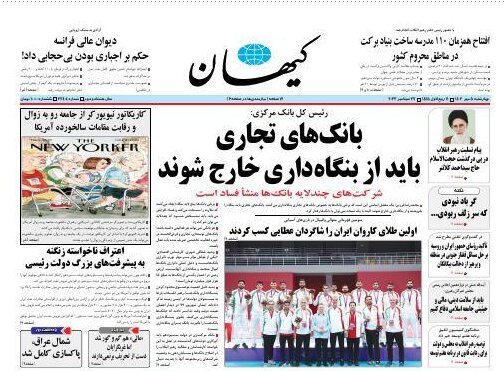TEHRAN PAPERS

Kayhan devoted its editorial to the security agreement between the governments of Iran and Iraq (which aims to secure the common border between the two countries) and wrote: The agreement started to get fully implemented in September.
In a matter of a few days certain areas in the Iraqi soil overlooking Iran were cleared from armed groups and terrorists supported by the U.S., Europe, and some other regional governments. During the riots that occurred in Iran in fall of 2022, the headquarters of armed groups stationed near Iran became an active instigator of violence inside the country. They turned the riots into a military and security issue that would have not been resolved if the Islamic Revolution Guard Corps had not intervened militarily. The IRGC ended up carrying out heavy attacks on some hideouts and bases of these groups. That eventually helped curb the riots and re-establish calm in the country. We know so far that based on the security agreement between Iran and Iraq, some members of the criminal groups active against Tehran have been identified and classified. Also, hundreds of members have so far left Iraqi soil, and based on the recent developments in the region it is expected that more terrorists will decide to flee Iraq and leave the area. Since expelling the Mujahedin-e-Khalq terrorists from Iraq, this is Iran’s second successful attempt at clearing its borders and ensuring security.
Iran: Solving South Caucasus issues without foreign interference
In its headline, the Iran newspaper discussed the latest developments in the Caucasus region and said: Turkish President Erdogan said opening the so-called Zangezur Corridor in the South Caucasus is a strategic issue for Turkey. However, he said, "If Armenia prevents the opening of the Zangezur Corridor, this corridor can pass through Iran." Looking at the latest remarks by the Turkish president, it seems that the main actors in the region have finally come to realize the geopolitical reality of the region and by taking into consideration the global and regional developments, they have decided to play a less provocative role while interacting with their neighbors. It seems that they have decided to prioritize stability and security in the region and refrain from escalating tensions. Important actors of the region now prefer to pursue dialogue through various forms which could include using the “3+3” process in the Caucasus region. In the midst of the recent tense movements between Baku and Yerevan, the follow-up of this matter was taken into consideration in the telephone conversation between Raisi and Putin, the presidents of Iran and Russia, and both sides emphasized the necessity of dialogue in the form of "3+3" and avoiding foreign interference in this issue.
Shargh: Direct negotiations with US: Rumor or fact?
In an analysis, Shargh discussed the rumor of authorizing direct negotiations between Iran and the United States. It wrote: The Ministry of Foreign Affairs has denied the claim published in the media that direct negotiations between Iran and the United States will be held in Oman in the coming weeks and declared that this type of news production and media games, which are usually done to create an unhealthy political atmosphere, lack credibility. Earlier, Hossein Amir Abdollahian, Iran's Foreign Minister, said a potential return to the agreement depends on the readiness of the Western parties and that the exchange of messages with the United States continues and the Sultan of Oman's initiative is still on the table. If the opposite parties are ready, we are serious about returning to the JCPOA so that all parties return to their commitments in the JCPOA within the framework of the Oman initiative. Also, Hossein Amir Abdollahian, in an interview with Kyodo news agency, noted that Japan has presented an initiative to resume nuclear negotiations and that any Japanese initiative that is in line with "Iran's interests" will be viewed positively by Tehran and that Iran supports Japan's constructive role in reviving the nuclear agreement.
Sobh-e-No: Strengthening parliamentary ties between Iran and BRICS
In a note, Sobh-e-No addressed the official invitation of the speaker of the National Assembly of South Africa for Ghalibaf, the Speaker of the Iranian Parliament, to participate in the 9th Parliamentary Assembly of the BRICS countries. The paper said: According to Ghalibaf, Iran can widen the circle of communication and provide more economic and political opportunities for the country. For this purpose, bilateral communication between the Islamic Republic of Iran and South Africa and dialogue between BRICS countries and parliaments will be conducted during this trip. This forum has a multilateralism approach and strengthens the relations between BRICS and African countries, so it is a good opportunity to pursue bilateral parliamentary relations and develop our parliamentary relations with other African countries. Since last year and after President Ebrahim Raisi took office, Iran has decided to focus on strengthening its political and commercial relations with neighboring countries as well as its allies in the East; an approach that aims to diversify Iran's economy and neutralize the U.S. economic sanctions.
TAGS

No comments:
Post a Comment